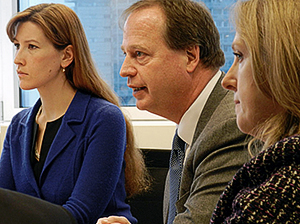

The Vienna Center for Disarmament and Non-Proliferation (VCDNP) and the Stanley Foundation co-hosted a lunch and roundtable discussion on 9 December 2013 titled "Planning for Success at the 2014 Nuclear Security Summit in the Netherlands." William Tobey, senior fellow at Harvard's Belfer Center for Science and International Affairs and former deputy administrator for Defense Nuclear Nonproliferation at the Department of Energy's National Nuclear Security Administration (NNSA), served as the featured guest. Further insights were also offered by the event moderators, Elena Sokova, executive director of the VCDNP, and Anya Loukianova, program officer at the Stanley Foundation.
Mr. Tobey, who also gave a luncheon briefing at the VCDNP before the 2012 Nuclear Security Summit in Seoul, expressed his optimism that nuclear terrorism can be prevented; he noted, however, that much work remains to be done identifying and correcting flaws in the current nuclear security system. Mr. Tobey pointed to his recently published Stanley Foundation policy brief in which he describes the July 2012 security breach by three activists (including an 82-year-old nun) of the US Y-12 facility in Oak Ridge, Tennessee, as an "important wake-up call" for nuclear security that raises questions about the security of highly enriched uranium and plutonium. In his view, this breach was not simply one isolated incident—he pointed to several others—but rather a result of a system-wide sense of complacency and failure to create a sufficiently rigorous security culture.

To fight complacency and otherwise strengthen international nuclear security, Mr. Tobey recommended that the world leaders participating in the 2014 Nuclear Security Summit in the Netherlands pursue the following broad policies:
Mr. Tobey conceded that there may be benefit to having a more coherent governance structure for nuclear security, instead of the fragmented structure that currently exists; he expressed his concern, however, that working toward such a super-structure may hamper overall progress. Instead, Mr. Tobey contended that specific incremental improvements should continue, despite their lack of comprehensiveness. Mr. Tobey concluded that the Nuclear Security Summit process has been overwhelmingly positive, particularly for the focus that it has drawn and continues to draw from national leaders to nuclear security issues, though he sensed that there may be a growing "summit fatigue". He recommended that, after the planned 2016 Nuclear Security Summit in the United States, states consider a hybrid process for the future that would feature heads of state meetings at longer intervals, together with under-secretary-level working meetings at shorter intervals.


